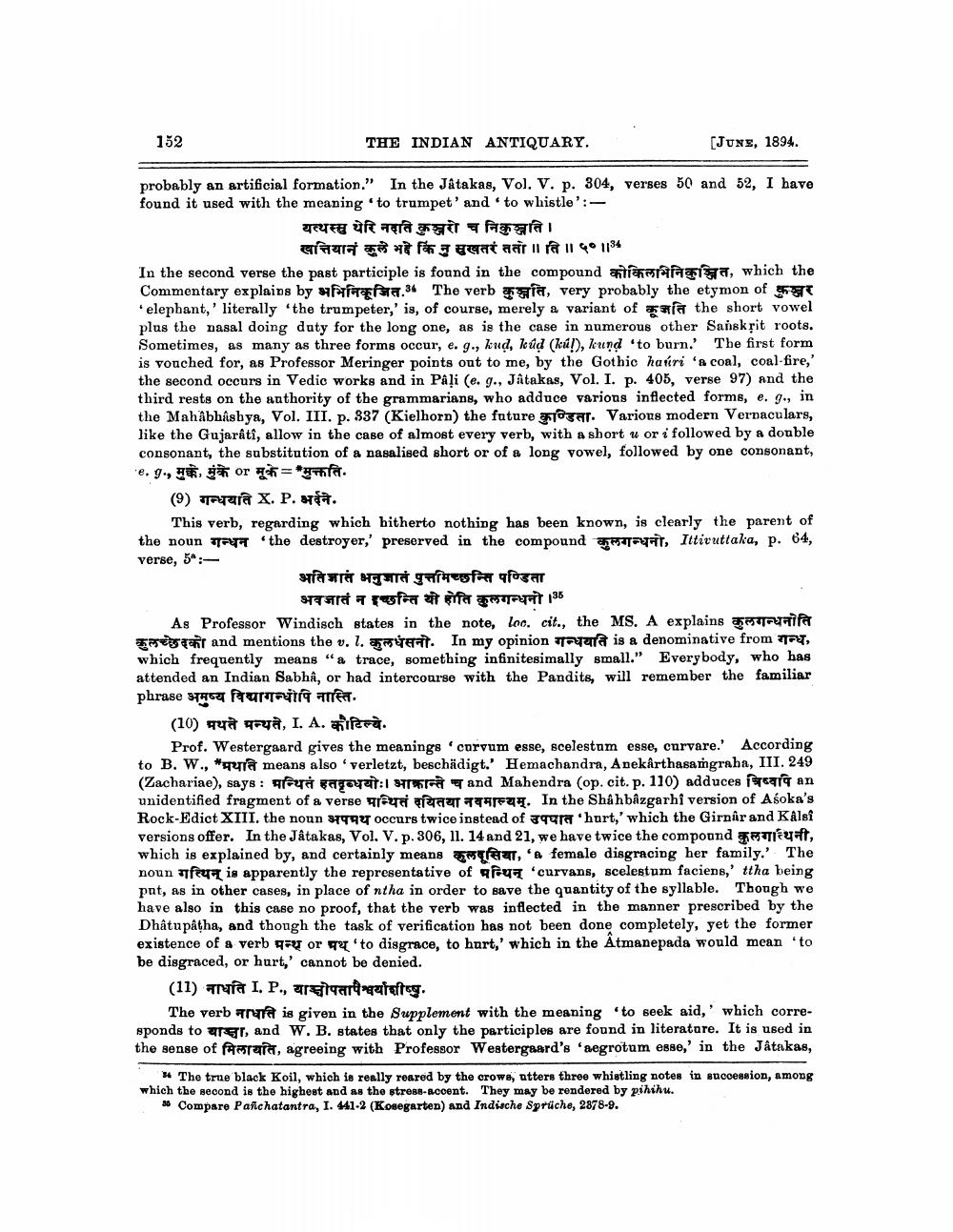________________
152
THE INDIAN ANTIQUARY.
[JUNE, 1894.
probably an artificial formation." In the Játakas, Vol. V. p. 304, verses 50 and 52, I have found it used with the meaning to trumpet' and to whistle':
यस्थस्स येरि नदति कुञ्जरो च निकुञ्जति ।
arra fagua aina 114 1134 In the second verse the past participle is found in the compound alichofana, which the Commentary explains by भभिनिकूजित.4 The verb कुजति, very probably the etymon of कुञ्जर * elephant,' literally the trumpeter,' is, of course, merely a variant of a the short vowel plus the nasal doing duty for the long one, as is the case in numerous other Sanskrit roots. Sometimes, as many as three forms occur, e. g., kud, kad (kú!), kund 'to burn. The first form is vouched for, as Professor Meringer points out to me, by the Gothic hauri 'a coal, coal-fire,' the second occurs in Vedic works and in PAļi (e. g., Jatakas, Vol. I. p. 405, verse 97) and the third rests on the authority of the grammarians, who adduce various inflected forms, e. 9., in the Mahâbhishya, Vol. III. p. 337 (Kielhorn) the future logar. Various modern Vernaculars, like the Gujarati, allow in the case of almost every verb, with a short u or i followed by a double consonant, the substitution of a nasalised short or of a long vowel, followed by one consonant, e. 9., gã or =#
y a. (9) tula X. P. **.
This verb, regarding which hitherto nothing has been known, is clearly the parent of the noun Tayt 'the destroyer,' preserved in the compound W a r Ittivuttaka, p. 64, verse, 59:
अतिजा भनुजातं पुत्तमिच्छन्ति पण्डिता
अवजातं न इच्छन्ति यो होति कुलगन्धनो।35 As Professor Windisch states in the note, loc. cit., the MS. A explains s ala कुलच्छदको and mentions the v... कुलधंसनी. In my opinion गन्धयति isadenominative from गन्ध, which frequently means "a trace, something infinitesimally small." Everybody, who has attended an Indian Sabhậ, or had intercourse with the Pandite, will remember the familiar phrase kasz PurTI TIET.
(10) que qrua, I. A. mifera.
Prof. Westergaard gives the meanings 'corvum esse, scelestum esse, curvare. According to B. W., "qyra means also verletzt, beschädigt.' Hemachandra, Anekârthasangraha, III. 249 (Zachariae), says : afera gargoyut: 1 Tand Mahendra (op. cit. p. 110) adduces for an unidentified fragment of a verse qu 22 T F44. In the Shahbâzgarhi version of Asoka's Rock-Edict XIII. the noun 1994 occurs twice instead of 'hurt,' which the Girnar and Kalsi versions offer. In the Jâtakas, Vol. V. p. 306, 11. 14 and 21, we have twice the compound Tieft, which is explained by, and certainly means tha, 'a female disgracing her family. The noun feyz is apparently the representative of any 'curvans, scelestum faciens,' ttha being pnt, as in other cases, in place of ntha in order to save the quantity of the syllable. Though we have also in this case no proof, that the verb was inflected in the manner prescribed by the Dhâtupatha, and though the task of verification has not been done completely, yet the former existence of a verb qy or 'to disgrace, to hurt,' which in the Atmanepada would mean 'to be disgraced, or hurt,' cannot be denied.
(11) Ana I. P., arxar qaratoy.
The verb ta is given in the Supplement with the meaning to seek aid,' which corresponds to rear, and W. B. states that only the participles are found in literature. It is used in the sense of famera, agreeing with Professor Westergaard's 'aegrotum esse,' in the Jâtakas,
* The true black Koil, which is really reared by the crowe, atters three whistling notes in succession, among which the second is the highest and as the stress-a-coent. They may be rendered by pihihu.
Compare Panchatantra, I. 441-2 (Kogegarten) and Indische Sprüche, 2878-9.




